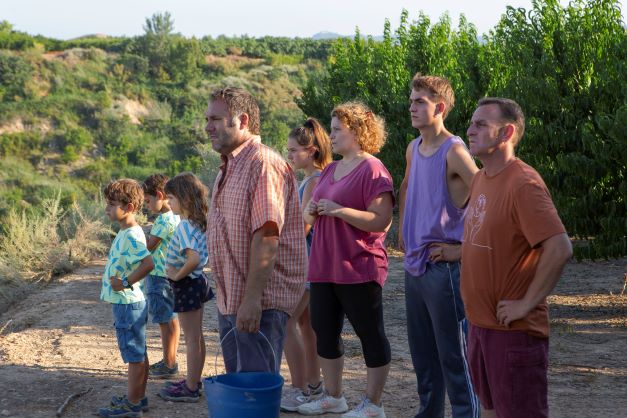The New York Film Festival offers early access to some of the most anticipated films of the year, including many that will keep attracting buzz as potential best-of-the-year favorites and/or future award recipients. Considering the generous selections presented in the programming, sometimes the smaller films, or the ones hard to digest, could easily be overlooked. In any case, there were a lot of discoveries among the titles presented in the festival’s 60th edition that should not be missed when they are officially released.
The Golden Bear winner from the Berlin Film Festival, Carla Simón’s Alcarràs, has also been selected to represent Spain for the Best International Feature Film Oscar (an atypical choice since the film is largely spoken in Catalan). It’s a modest but robust second-feature for the Spanish filmmaker that benefits from its austerity and naturalistic style in its portrayal of the family Solé. They congregate every summer to work in a country field where they harvest seasonal peaches. However, everything is about to change for the family due to the installation of solar panels overtaking the orchard where they are supposed to work hard during the upcoming months. This action is directly related to the future (and unavoidable) sale of the land by the landlord, who reaps the profits from the tenants’ hard work. So, the film is about a last summer experience while on the verge of a major loss. After which, life won’t be the same for the Solés.
Yes, it sounds like an overused trope, but what is endearing is how Simón approaches this material without pretensions through a firm and unsentimental perspective. The family dynamics between each member is constantly evolving, disclosing tensions and foreshadowing significant ruptures as a result of the looming crisis. A moment of respite features them in the middle of a crowded dinner, just in time to take a family picture. It’s a crucial moment that invites assumptions about the different ways this captured moment will be remembered for years to come. Later, the last image of the family involves the final crushing of their hopes to remain in their home, though it’s not recorded by a photograph. It’s the film’s decisive image, the real snapshot, that will become part of this family memory.
Alcarràs captures a universal sadness about times that can’t be recovered and will later become a cornerstone of sorrow.
As part of the recent crop coming from the most recent Cannes Film Festival (the Director’s Fortnight parallel section, to be exact), Scarlet is also the newest work by Italian director Pietro Marcello (the political epic Martin Eden), although this is a French film. Marcello’s follow-up is another period piece that couldn’t be more different in terms of scope and ambition. It’s an enchanting fairy tale for adults and at times an off-beat musical about a toymaker and his beloved daughter, Juliette (Juliette Jouan), who will grow up to become the untamed village beauty.
It was once predicted she would one day fly away on a ship with red sails, according to a witch’s prophecy. Since she was a child, the motherless Juliette has been ostracized and treated as a “witch” among her peers, which is probably code for “bastard” because her mother was raped when her father was off fighting in World War I—on his return home, he immediately accepts her as his own. Despite her scarlet-letter status, she becomes the object of desire among the local boys, but she’s not interested in romance, not until the accidental arrival of a handsome pilot (Louis Garrel).
Pastoral cinematography and luscious music make Scarlet a romantic experience, not only because there is a love story involved. Imbued by sweet and quirky cinematic magic that evokes Jacques Demy musicals in a minor scale, this is the kind of film that would have been considerably better if it embraced a genre completely (it doesn’t), yet it’s exuberant and uplifting in the sequences where music commands the images and sounds. You may think of Scarlet as a welcomed dessert.
Finally, one of the most challenging releases this year—although extremely fascinating if you are willing to accept it on its terms—is another Cannes export from its official competition. Pacifiction is the latest from Catalan filmmaker Albert Serra, a director who represents best the rich multicultural character of Europe. Take this French film set in a Polynesian island as an example. What to make of a movie like this would depend of the individual experience of every viewer who embraces it (or abandons it), but it’s also the type of project that is enriched by post-screen discussions.
The quote “Politics are a nightclub” (as stated by its central character in a rambling monologue inside a car) is barely a handhold to understand (or to absorb, more precisely) this feverish and hallucinatory film about a French bureaucrat, High Commissioner De Roller, who constantly negotiates and mediates (and parties) as a benevolent patriarch. That’s the basic plot in a cinematic riddle that resists giving answers. Benoît Magimel embodies the cryptic De Roller with poignant urgency, even if we are never sure what he really does on this South Pacific island or know anything about his past. Maybe he’s just another soul condemned to a limbo.
Non-professional actors accompanying the star provide authenticity, including a transgender woman, Shannah (Pahoa Mahagafanau), who plays a bartender, dancer, and possibly the lover of the French official. There’s the ongoing dynamic of good conqueror vs. bad conqueror between De Roller and an Admiral (Marc Susini) involved in a secret project involving nuclear tests, as well as a local revolution about to explode. The 162-minute film can be described as an indictment against colonialism, but that doesn’t sound accurate as a final description about a work that seeks artificiality on purpose, avoiding an easy denounce in favor of surreal images and sounds that mold a beautiful looking nightmare. A breathtaking sequence of surfers riding high waves, dances suddenly breaking out in the island’s popular nightclub, and the constant feeling of chaos reach the ambition and weirdness to conjure hells like Coppola’s Apocalypse Now or some Herzog films (Aguirre, Wrath of God and Fitzcarraldo), even if Serra’s films are their own genre.
There are enough intoxicating enigmas in Pacifiction that would make you want to come back to it, at least for the pleasure of being in the hands of a filmmaker who restores some element of risk and unpredictability to cinema.









Leave A Comment